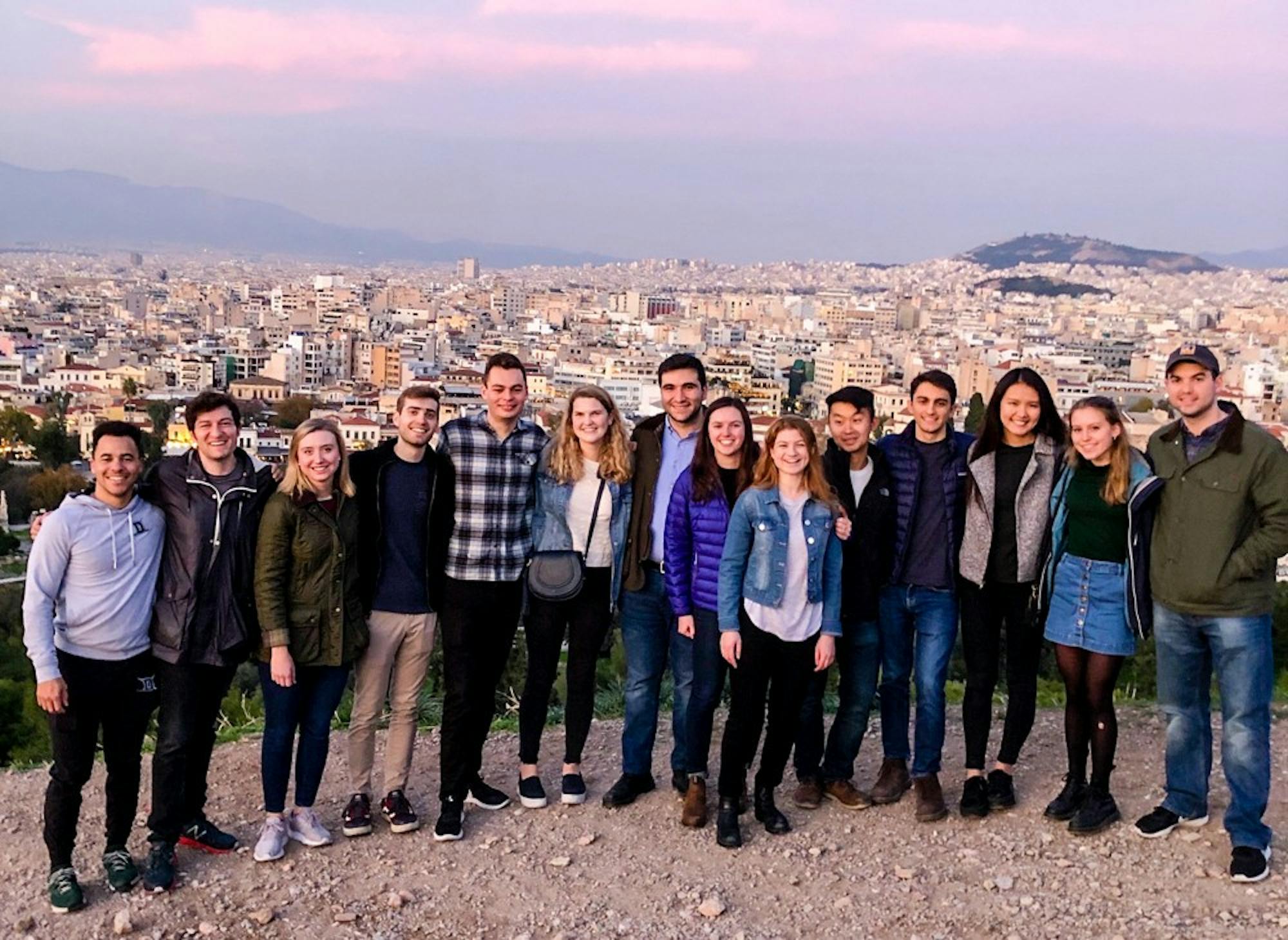While the academic term concluded for most Dartmouth students by the end of the fall, several classes continued their studies abroad, traveling to various locations across the globe for on-the-ground experiential programs that immersed them in the political, economic and cultural fabric of the countries they visited. A group of economics students ventured to Argentina on a trip sponsored by Dartmouth’s Political Economy Project, and public policy students spent two weeks traversing Europe, conducting research in Greece, Switzerland and Germany.
Students in ECON 70, “Macroeconomics Policy in Latin America: Argentina and Chile,” spent most of their two weeks in Buenos Aires, where they met with prominent government officials, business leaders, academics and nongovernmental organization leaders, according to economics professor Douglas Irwin. Irwin added that students used these meetings as an opportunity to expand on projects that they had drafted in the fall. Economics professor Marjorie Rose said that these projects ranged from studies of the national education system, to investigations of the financing of small and medium enterprises, to labor market regulations and informality. Irwin added that in the weeks leading up to the trip, the students cold-called experts independently to set up in-person meetings.
“We were blown away by the access that they got to high-level business people and academics,” Rose said, citing her students’ persistence as a primary reason for this exclusive access.
The groups were able to coordinate meetings with the deputy minister of labor, professors and world-leading economists, among others. In addition, students engaged in what Irwin called “economic tourism,” speaking with their cab drivers, as well as workers and management at local shops, cafés, wineries and an olive oil processing plant in order to gain a deeper understanding of the economic situations of everyday situations.
Victoria Meyer ’20 said that she and her peers spent their time researching the Argentinian and Chilean education systems, looking into gaps in education in both countries, examining the debate between public and private education and the problem of unequal access to private schools, and proposing possible ways of creating a more equitable and accessible system.
“It’s a lot easier to understand a country when your feet are on the ground and you’re meeting with people live,” Meyer said.
The class had initially planned to go to the Chilean capital of Santiago, but when violent protests in the city continued into the weeks leading up to winter break, the professors opted to cancel this portion of the trip.
According to Rose and Irwin, the group spent roughly a third of its time in full-group lectures and talks, where they had the opportunity to listen to and engage with prominent figures in Argentinian economics, — namely Federico Sturzenegger, former president of the Argentinian central bank, and Domingo Cavallo, a chief architect of a major economic reform program in Argentina in the 1990s. Despite the cancellation of the Chile trip, students were also able to have a digital conference with Andrés Velasco, Chile’s former finance minister.
While economics students studied emerging markets in South America, students in PBPL 85, “Global Policy Leadership,” led by government professor Herschel Nachlis, traveled to Europe to investigate international responses to the global financial crisis, Eurozone crisis and the rise of populism across Europe. In Athens, students had group meetings with prominent figures in Greece’s government, meeting with former deputy prime minister Evangelos Venizelos and former finance minister Gikas Hardouvelis, in addition to meeting with the director general of Greece’s leading think tank, the vice president of the largest nonprofit in Greece and the chief economist of the Bank of Greece.
After Athens, the group traveled to Frankfurt, Germany where they attended a lecture at the European Central Bank. Additionally, they were able to speak with leading filmmaker Alison Klayman — whose most recent film covered Steve Bannon’s work in mobilizing far-right parties globally — and an official from the International Monetary Fund.
From Frankfurt, the group traveled to Basel, Switzerland to meet with an array of economists from the Bank of International Settlements.
In the final major leg of the trip, the group visited Berlin to visit the Bundestag, Germany’s national parliament, and German television network DW-TV. Throughout the entire trip, the students were also able to meet with a variety of Dartmouth alumni.
“To my mind, there were few things as important as understanding the political, economic and social lessons of the last economic crisis for future generations of policy makers,” Nachlis said.
Of the objectives of the class, Nachlis said that he saw the trip as an “opportunity to hopefully impart some lessons on Dartmouth students, so that when they’re sitting in the seats of the people that dealt with the last crisis 10 or 20 years from now, they can hopefully on the margin improve upon some of the dimensions they learned about.”
Students on the trip said they came away from the class appreciative of the real-world, first-person experience the program had to offer.
Bethany Burns ’20 called the trip a great way to better understand the issues discussed in the classroom at a deeper level, and said that the experience helped her “either confirm or complicate some of our previous findings.”
Luke Cuomo ’20 agreed that the trip had enriched his classroom experience, stating that “the class built up to the trip, and then by the time you’re in Europe and talking with people, the picture comes together.”
“You can read and read, but without the first-person experience and the conversations you’re able to have when you go on this trip, there’s a piece missing,” Cuomo said.
As a final deliverable product, students submitted a 128-page memo on their findings, laying out how the financial crisis unfolded and how the countries they visited responded.




